Choosing the Right Cage for Macaws: A Detailed Guide
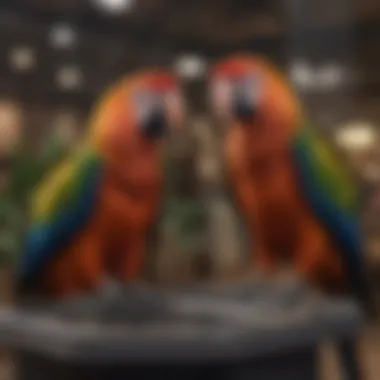
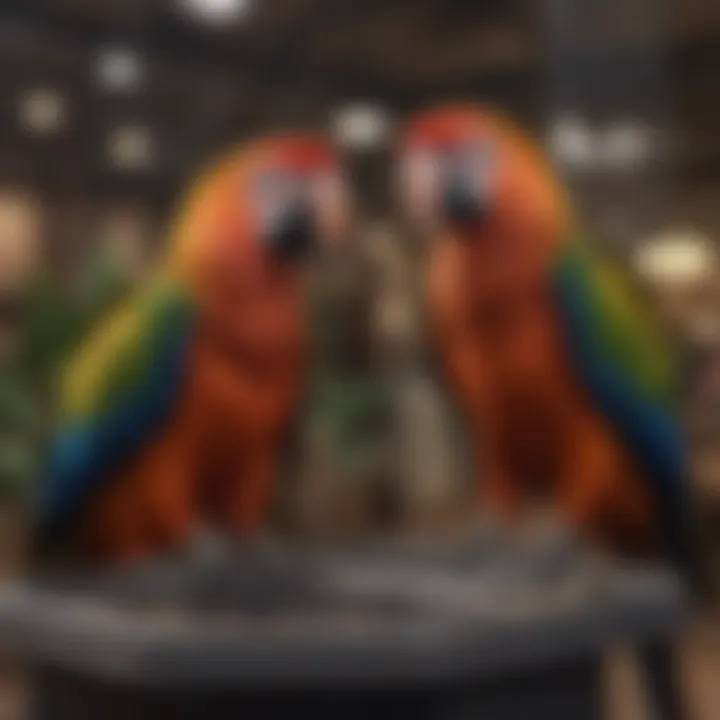
Intro
When it comes to providing the best environment for macaws, selecting the right cage stands as the cornerstone of their care. The glow of colorful feathers and the intelligence nestled in their eyes contribute to why many pet enthusiasts choose these avian companions. However, choosing a cage is not just a matter of picking something that looks good or fits in your living room decor. It's a commitment to creating a space that mirrors their wild habitats, characterized by ample room, stimulating features, and appropriate materials.
In this guide, we will thoroughly explore the essential elements that contribute to the welfare of your macaw and offer a roadmap to navigate the often-overwhelming choices available in the market. This isn't merely about size or aesthetics; it’s about understanding how these elements interplay to foster a thriving environment for your bird.
You might think, to yourself, what’s with the fuss over the cage? Well, in the wild, macaws are known to roam great distances, engaging with their environment in ways that enrich both their physical and emotional health.
Consequently, replicating this kind of habitat becomes vital to their overall well-being.
As we delve deeper into this subject, the focus will be on the key aspects of cage selection, littered with helpful insights and practical tips—including common pitfalls to steer clear of. Prepare to unravel the layers to ensure that your macaw not only survives but thrives in your home!
Understanding the Macaw
Understanding the unique nature of macaws is fundamental when it comes to selecting the right cage for these vibrant and intelligent birds. Macaws, with their striking plumage and engaging personalities, thrive in environments that cater to their specific needs. Recognizing their natural behaviors, social structures, and habitat requirements lays the groundwork for creating a suitable living space. This understanding not only enhances the birds’ welfare but also fosters a rewarding relationship between the owner and the pet. Selecting the appropriate cage is more than just a matter of size; it’s a step toward enriching their lives and ensuring their overall well-being.
Species Overview
Macaws belong to the family Psittacidae, encompassing a diverse range of species, each with its unique traits. The most recognized among these include the Blue and Gold Macaw, Scarlet Macaw, and Hyacinth Macaw. Each species showcases a vibrant color palette and possesses distinctive vocalizations, making them not only stunning companions but also engaging communicators.
Understanding the differences between species is paramount. For instance, the Hyacinth Macaw, the largest of the macaw species, requires a much larger cage than the smaller Blue and Gold Macaw. Keeping this in mind is crucial as it determines every aspect of a bird’s life from physical health to psychological well-being.
“The beauty of a macaw is not just skin deep; it lies in their instincts and behaviors, which are deeply tied to their natural environments.”
Behavioral Characteristics
Macaws are known for their expressive and inquisitive nature. Their behaviors reflect their intelligence and social complexity. For example, they are often seen hanging upside down, using their beaks to explore their surroundings. They are naturally curious birds, often learning quickly from their interactions with the environment and their owners.
Some common behavioral traits include loud vocalizations, playful antics, and even problem-solving skills. It is critical to factor these traits into the design of their cage. A cage that focuses solely on physical space yet lacks engaging elements like toys or climbing structures will likely lead to boredom and stress.
Social Needs
Macaws are inherently social creatures, often forming tight bonds with their flock—be it in the wild or in captivity. Their need for social interaction can't be overlooked. Denying macaws enough companionship—be it from other birds or human interaction—can result in behaviors like feather plucking or depression.
When deciding the size and design of a macaw's cage, consider the following:
- Companionship: Allow room for playdates or flying space if possible.
- Interaction: Position the cage in a common area where the bird can engage with family activities which fosters social bonds.
- Stimulation: Include various toys and scheduled playtime to meet their social needs.
Creating an environment that mirrors their natural habitat gives macaws a positive outlet for their social instincts. By grasping what makes macaws tick, owners set the stage for a healthy and fulfilling life for their feathered companions.
In summary, a detailed understanding of macaws encompasses their species specifics, behavioral dynamics, and social inclinations, all pivotal for choosing an accommodating cage. Delving into these aspects ensures that not only is the bird kept healthy, but it also nests in an environment that uplifts its spirit.
Cage Size Requirements
When it comes to providing a home for macaws, size matters—greatly. These vibrant birds are not just companions; they are intelligent creatures with a keen need for space. The right cage size can mean the difference between a contented macaw and a frustrated one. A cramped space can lead to behavioral issues such as excessive screaming or feather plucking, which is not just detrimental to their physical health but affects their mental well-being as well. Therefore, understanding the specific cage size requirements for macaws is a significant step toward ensuring that these beautiful birds thrive in your care.
Minimum Dimensions
It’s imperative to establish a baseline when selecting a cage for macaws. Ideally, the measurements should align with the specific species you are considering, but a good rule of thumb is to opt for a minimum cage size of around 6 feet long, 4 feet wide, and 4 feet tall. The more room, the merrier. This size allows them to stretch their wings fully without risk.
An adult macaw may weigh anywhere between 2 to 3.5 kg, making their wingspan considerable—often reaching over 3 feet. Ensuring that the cage is spacious enough for even a high-speed flight (if circumstances allow) significantly contributes to their overall happiness. The minimum dimensions are not just guidelines; they are a foundation upon which a healthy environment may be built.
"A well-sized cage is not a luxury, but a necessity for macaws. Think of it as their playground, sanctuary, and sleeping quarters rolled into one."
Space for Movement
Macaws are natural climbers and explorers. When you select a cage, think beyond just the bare dimensions. Good design incorporates vertical space and numerous opportunities for movement—macaws should not just stand in their cage. They need enough space to dash from perch to perch, climb, and even hang upside down occasionally!
Providing climbing features, such as sturdy perches, ropes, and ladders, can maximize the effective space of a cage. It’s vital to design the interior of the cage in a way that mimics their natural inclination to explore their surroundings. Without adequate room to move about freely, your macaw may exhibit signs of distress, which can manifest through destructive behaviors or health problems.
In summation, a carefully considered cage size is central to supporting the well-being of a macaw. Not only does it prevent stress and encourage natural behavior, but it also enhances the overall quality of life for your feathered companion. A happy macaw will show you their true colors, and a spacious cage is the first step towards realizing that vibrancy.
Materials for Macaw Cages
Selecting the right materials for macaw cages is like picking the right ingredients for a gourmet meal; it determines the quality and safety of the end product. A well-constructed cage made from suitable materials not only ensures the physical well-being of your macaw but also offers a space where they thrive, a sanctuary, if you will. Birds, especially intelligent types like macaws, require security and comfort, which begins with the cage’s construction. The choices you make about materials can significantly affect factors such as durability, toxicity, and ease of maintenance, all of which contribute to your feathered friend’s overall health and happiness.
Metal Types and Durability
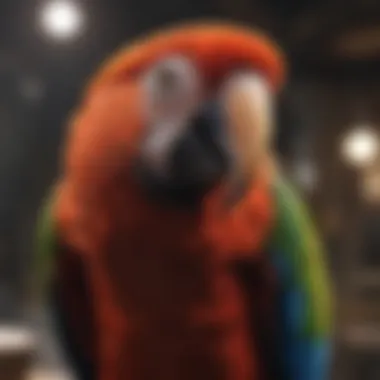
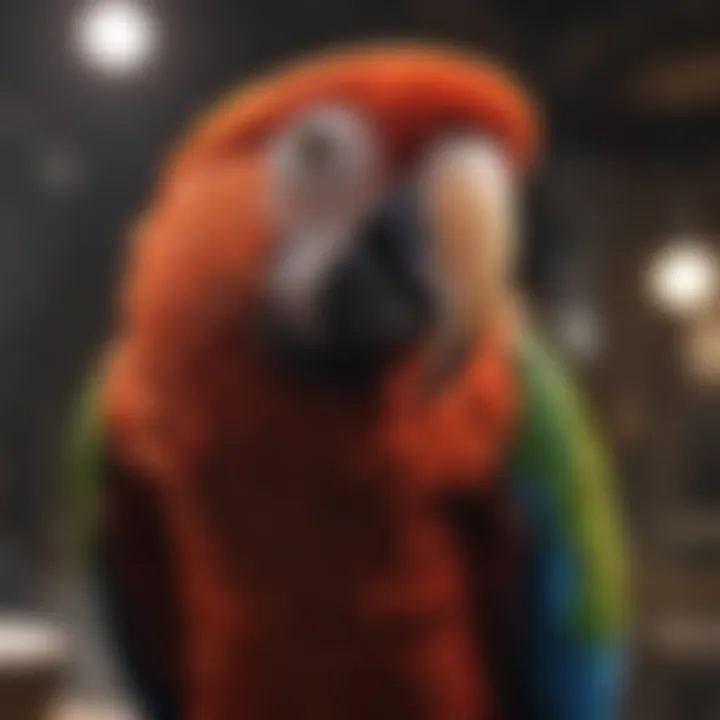
When it comes to metal types, a few stand out as ideal. Stainless steel is often the gold standard due to its durability and resistance to rust or corrosion. Unlike other metals, it doesn't require a special coating, which is a boon in terms of maintenance. You’ll often find cages that are marketed as stainless steel, but do check the specifications because some cheaper variants could be mixed with lower-quality metals.
Wrought iron can be another favorite among bird owners. It's sturdy and withstands the enthusiasm of a lively macaw. However, it requires careful evaluations since untreated wrought iron can rust, particularly in humid environments. Opting for powder-coated wrought iron can mitigate some of these concerns, but be wary of dips in quality; not all coatings are created equal.
Here’s a brief overview of metal types commonly used in macaw cages:
- Stainless Steel: Strong, rust-resistant, long-lasting.
- Wrought Iron: Durable but needs protective coatings to prevent rust.
- Galvanized Steel: Generally cheaper, but requires scrutiny due to potential zinc toxicity if flawed.
It's critical to steer clear of metals like aluminum or any metal that might be coated with toxic substances. It’s often not worth the risk when your beloved bird’s health is on the line.
Non-Toxic Coatings
The coatings on metals can be a double-edged sword. Although they can protect your cage, they may also harbor harmful substances. So, what should you be looking for? Non-toxic, bird-safe coatings are your best bet. These are often marketed as "safe for pets" or "bird-safe". Brands worthy of consideration avoid using harmful chemicals like lead or zinc, as even small amounts can be dangerous for your macaw.
Always check the label and seek out cages with powder-coated finishes made from non-toxic materials. Not only does this guard against rust, but it also lowers the chance of your bird nibbling on any harmful residue.
Here’s how it breaks down:
- Powder Coating: Generally safe if labeled correctly; provides a protective layer against rust.
- Enamel Coatings: These can be safe but are sometimes less durable; use caution and always verify.
Choosing materials and coatings for a macaw's cage isn't just about aesthetics or initial costs; it's about laying the foundation for a safe, enriching environment. The right choices create a framework for a happy, healthy bird life, which is what we all want.
"Trust your instincts. Just because it’s marketed for birds doesn’t mean it’s suitable for your macaw."
In summary, pay close attention to the materials and coatings you choose. The choice will shape your macaw's living environment and can either contribute to their well-being or lead to unexpected problems down the line. So, like any responsible bird parent, do your homework and choose wisely.
Cage Design Features
Selecting the right cage for your macaw goes beyond size and materials; the cage design features play a significant role in ensuring the well-being and safety of these magnificent birds. Properly designed elements can enhance your macaw's environment, making it both functional and comfortable. Let’s unscrew the details, focusing on bar spacing, access locks, and removable trays — three crucial features that can make or break the living space for your feathered friend.
Bar Spacing Considerations
When it comes to the spacing between bars, this is not merely a design aesthetic; it has real implications for your macaw's safety. Macaws are curious and strong creatures, capable of squeezing themselves through tight spaces. Ideally, the distance between bars should be no more than 1 inch. This ensures that your bird cannot escape or, conversely, get stuck in the bars.
Additionally, if your macaw is particularly prone to playfulness, wider spacing can allow for adventures that could lead to unfortunate accidents. The importance of bar spacing also extends to minimizing potential injuries. Sharp edges or improper spacing might risk harm and create an unsafe living condition.
"Choosing the right bar spacing could mean the difference between a happy pet and a trip to the vet."
A diligent examination of the cage design before purchase is smart. Many online resources can assist with this information, and forums such as Reddit or Facebook groups often have experiences shared by fellow bird owners. So, gather your intel before settling.
Access Doors and Latches
Let’s converse about access doors and latches. The entry point of the cage is more than a convenience; it’s about facilitating safe interaction between you and your macaw. Ideally, doors should open wide for easy access, especially when you need to clean or place food inside. A larger door will also reduce stress for your bird during handling.
When selecting the cage, keep an eye on the latch mechanism. It should be secure yet easy for an adult to operate. There’s nothing worse than a latch that poses a puzzle for clueless fingers, or, worse yet, a latch that easily comes undone, risking a free-roaming escapee.
A lockable latch can offer peace of mind. Some models come with dual locks or complicated latches that would challenge a determined macaw. A design that complements your lifestyle and also includes safety features is paramount.
Removable Bottom Trays
The bottom tray of a macaw's cage is often overlooked, but it’s a key aspect for maintaining cleanliness and ensuring a healthy environment. A tray that can be removed simplifies cleaning routines, making it easier to keep the habitat sanitary. Not only does this feature help in avoiding the buildup of droppings and debris, but it can also decrease odors and potential health risks.
When looking at trays, consider the materials used. Durable, non-toxic, and easy-to-clean surfaces can save you time and hassle in the long run. This would prevent stains and scratches that could harbor bacteria. Some designs may even offer a slight slope to facilitate easy drainage or debris collection — a little detail that can make cleaning a breeze.
Placement of the Cage
Selecting the right spot for your macaw's cage is nearly as crucial as the cage itself. The placement of the cage impacts your bird's well-being significantly, as it affects their interactions, environment, and overall health. A well-placed cage allows for adequate exposure to natural light, social interaction, and safety, creating a cozy sanctuary for your feathered companion.
Environmental Considerations
The environment surrounding your macaw's cage should be thoughtfully designed to enhance their life. Light plays a pivotal role in a macaw’s daily rhythm. It is advisable to place the cage in a location that captures good natural sunlight. This helps regulate their circadian rhythm, ensuring they have energy and enthusiasm throughout the day. For instance, positioning the cage near a window can be ideal, but be wary of direct, unfiltered sunlight that can overheat your bird or lead to sunburn.
Additionally, consider the noise levels in and around the cage. Macaws can be sensitive to loud, jarring sounds. Situating the cage away from loud appliances or busy areas of the home can foster a more serene environment for your bird. They thrive on a bit of company and will enjoy the hustle and bustle of family life, but the chaos surrounding their cage should remain at a manageable level.
In a nutshell, evaluating lighht conditions, noise levels, and floor traffic before settling on a spot not only ensures comfort for your macaw but also nurtures their emotional health.
Safety from Predators
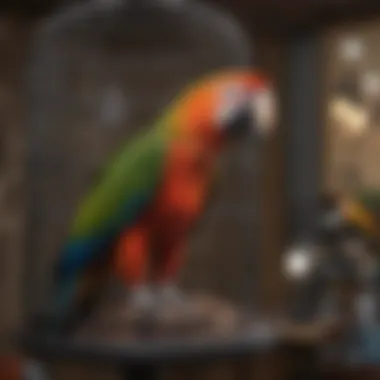
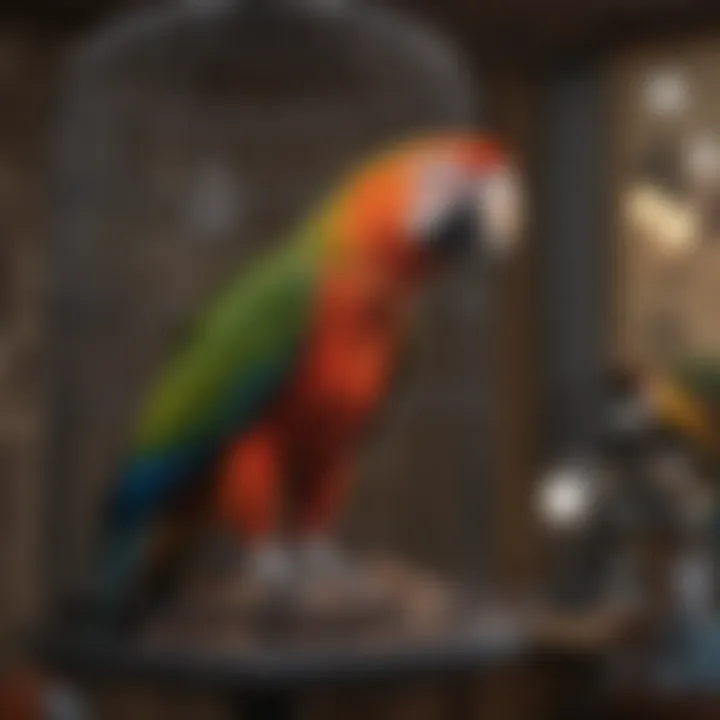
When choosing the cage's location, security mustn't be overlooked. The fear of predators, both real and imagined, can cause stress in your macaw, influencing their behavior. Small dogs, cats, or even larger birds can pose significant threats. Thus, placing the cage high enough, perhaps on a sturdy shelf or table, can act as a natural deterrent to floor-level predators.
Another aspect to think about is making sure the cage is positioned where the bird can see its surroundings. This vigilance helps them feel secure. Macaws are social and inquisitive creatures; they prefer to observe their environment. So, they should have unobstructed views of household activities while being safely out of reach of any threats. A cage positioned in a less trafficked area of the home may not only guard against danger but also reduce any anxiety your macaw may feel.
In summary, the ideal placement of your macaw's cage blends elements of environmental comfort and safety. By keeping light, noise, and potential threats in mind, you can create a setting where your bird thrives, making daily life more enjoyable for both of you.
Cage Enrichment Strategies
Cage enrichment is not just a fancy term for filling a macaw’s home with colorful toys. It’s a vital aspect of their well-being that directly affects their physical health and mental stimulation. Macaws are intelligent creatures, known for their playful and curious nature. Without proper enrichment, these birds can easily become bored, stressed, or even develop harmful behaviors like feather plucking. Therefore, understanding the elements of cage enrichment becomes crucial for any macaw owner.
In considering cage enrichment strategies, you should focus on several key areas: toys and activities, as well as perches and platforms.
Toys and Activities
When it comes to toys, think of your macaw’s cage as a playground. Providing a variety of toys not only keeps them occupied but also helps in mental engagement. Here are some suggestions:
- Chewing Toys: Macaws have strong beaks, and they love to chew. Offer them wooden blocks or natural branches that they can gnaw on. This helps maintain their beak health and keeps them entertained.
- Puzzle Toys: Toys that require them to solve problems to get a treat can stimulate their minds. These toys come in various complexities and can keep your feathered friend engaged for hours.
- Swinging and Climbing Toys: Swings invite playful movement while climbing toys encourage physical exercise. Both are essential for burning off excess energy.
- Interactive Toys: Toys that make sounds or have moving parts can be particularly engaging. Think of things like hanging bells and rattles.
Be mindful to rotate toys regularly to maintain novelty—just like a toddler who quickly gets tired of the same old toys, your macaw might lose interest too if nothing changes.
Perches and Platforms
Perches play a significant role in the happiness of your macaw. They need more than just a flat, boring surface to stand on. Consider the following:
- Variety in Heights and Thicknesses: Different heights of perches cater to their natural behavior of climbing and exploring. Thicker perches mimic those found in the wild and offer tactile variety for their feet, which helps in preventing foot problems such as bumblefoot.
- Material Choices: Natural wood perches provide better grip and are more comfortable than many synthetic options. Look for untreated branches free from pesticides and toxins.
- Flat Platforms: Adding flat surfaces inside the cage provides a resting spot and can serve as a stage for playtime. Enriching the cage floor with textured materials can also offer a different kind of experience for your macaw.
Incorporating suitable enrichment strategies is an investment in your bird’s quality of life.
"The better the environment, the better the bird."
Ensuring macaws have diverse and stimulating environments will enhance not only their happiness but their health too. Always monitor their interactions with toys and adjust as needed to keep them engaged without overwhelming them.
By offering a rich environment filled with engaging toys and thoughtfully designed perches, you help ensure that your macaw thrives as a happy, healthy member of your family.
Maintenance of the Cage
Keeping a macaw is no small feat, and maintaining their cage is just as critical as choosing the right one. A well-maintained cage not only promotes the well-being of your feathered friend but also keeps the environment clean and safe. Macaws are curious, intelligent creatures that thrive in a healthy, stimulating habitat. Proper maintenance ensures their physical and mental health is optimized while preventing any unforeseen issues down the road.
Regular maintenance involves two key components: cleaning regimens and inspecting for damage. Each plays a fundamental role, as neglecting these aspects could lead to serious health concerns for your bird.
Cleaning Regimens
When it comes to cleaning, think of it like being a diligent housekeeper, only this time, the house needs to be bird-proof. A regular cleaning schedule helps prevent the buildup of debris and bacteria that can harm your macaw. Consider the following routine:
- Daily Tasks: Remove uneaten food, empty the water dish, and give the cage a quick wipe down. It doesn’t take much effort but makes a world of difference.
- Weekly Tasks: Conduct a deeper clean by removing the perches, toys, and any accessories from the cage. Wash them separately in warm, soapy water to eliminate potential pathogens.
- Monthly Tasks: A thorough cleaning should be on the agenda. Disinfect the entire cage, including the bars, bottom tray, and the outside surfaces. Use a bird-safe disinfectant to ensure no harmful residues remain.
"A clean cage is a happy cage. Keeping your macaw's home tidy isn't just for you, it’s for their well-being too."
The frequency and depth of the cleaning can vary based on your macaw's habits. Macaws are notorious for their messy eating tendencies, so if your bird tends to scatter food or shred toys, you might need to clean more often.
Inspecting for Damage
Besides regular cleaning, inspecting the cage for any signs of wear and tear is vital. Macaws can be quite destructive, given their strong beaks and need to chew. Look out for:
- Broken Bars: Check periodically for any weak points in the cage. A bent or broken bar can lead to dangerous escapes or injury.
- Rusting or Corrosion: If the material is starting to rust, that could expose your bird to harmful particles. This is especially true for cages made from low-quality metals or those lacking protective coatings.
- Sharp Edges: Examine the edges where materials meet. A sharp edge can cause cuts or scrapes, leading to infections.
Making a habit of these inspections ensures that the cage remains sturdy and safe. Replacement of damaged elements should be done promptly to keep your macaw in a secure environment.
With a thoughtful maintenance routine, you create not just a physical space, but a nurturing environment that supports a long and happy life for your avian companion.
Common Mistakes to Avoid
Choosing the right cage for a macaw is no small feat. Many first-time macaw parents can trip over common missteps that can lead to serious problems. Understanding the importance of these mistakes can not only save you time and money but also ensure the well-being of your feathered friend. There are two key areas where new owners often fumble: inadequate size and ignoring social needs. Both can deeply affect a macaw's health and happiness. Let's explore these crucial elements.
Inadequate Size
When it comes to housing macaws, the size of the cage is paramount. A cage might look good on the outside, but if it’s too small, that’s a different ballgame. Imagine a creature that needs to spread its wings and fly, being cramped in a tiny enclosure. It’s just not fair!
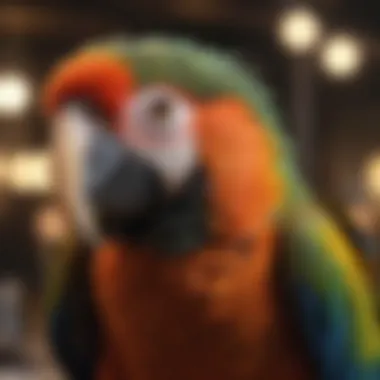
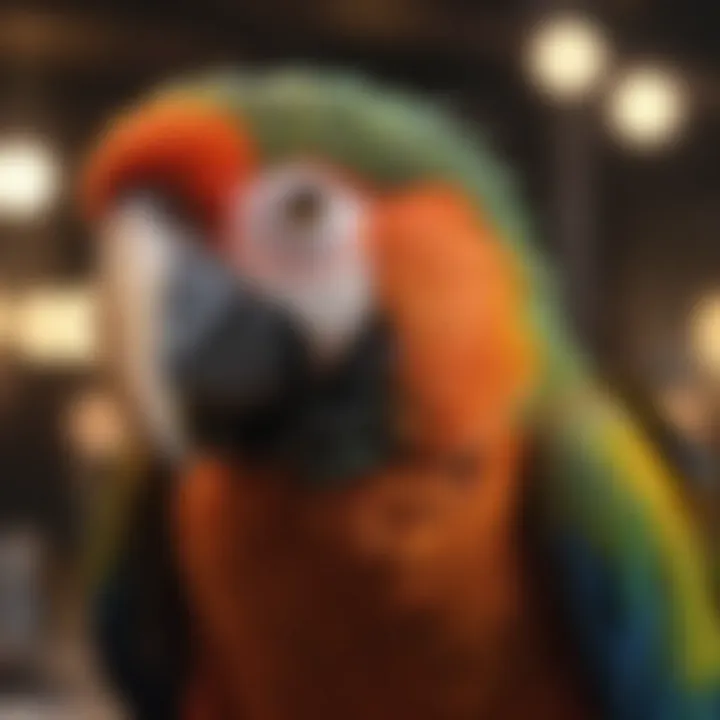
Macaws thrive in spacious environments, so the dimensions of the cage should reflect their needs. An insufficiently sized cage can lead to behavioral issues, such as aggression, excessive screeching, or even feather plucking due to stress.
Here are some vital guidelines to keep in mind:
- Minimum Dimensions: A standard guideline is that the cage should be at least 3 feet wide, 2 feet deep, and 5 feet tall. Still, your macaw may need larger dimensions based on its species and individual preferences.
- Extra Space for Activities: Be sure that the cage accommodates room for toys, food and water dishes, and essential perches. Keeping your macaw active will help stimulate their mental health too.
"An overcrowded birdcage is like a can of sardines – tightly packed and very uncomfortable.”
Ignoring Social Needs
Macaws are social creatures that require interaction not just with their humans but also with their surroundings. Ignoring these social needs is like taking away a child’s favorite toy; it creates an emotional void that can result in behavioral issues.
Macaws need companionship and mental stimulation to stay happy. Here are some pointers:
- Regular Interaction: Plan time each day to spend with your macaw. Whether it’s talking, playing, or simply hanging out, that interaction is critical for bonding.
- Multiple Birds: While not for everyone, considering a second macaw could enhance social dynamics. However, ensure that this decision aligns with your capacity to care for more than one bird.
- Environmental Enrichment: Include items that stimulate exploring and playing, such as swings, ladders, and varied toys. A neglected bird can become lonely and anxious, resorting to undesirable coping mechanisms.
In short, being aware of the common missteps when setting up a cage for your macaw will make a world of difference in its life. Tailoring their environment to meet their size and social needs can keep them healthy, spirited, and full of life. Remember, giving proper thought to a big cage for a big bird and ensuring regular bonding time is well worth it.
Cage Alternatives
When it comes to housing macaws, selecting an appropriate cage is pivotal for their well-being. However, traditional cages are not the only option available. Exploring cage alternatives can provide additional benefits for both the bird and the owner. These alternatives are especially important to consider for those looking to create a stimulating environment for their macaw, enriching their daily life and catering to their natural behaviors.
Aviaries
Aviaries are spacious enclosures that can make a world of difference for macaws. Unlike conventional cages, aviaries offer a wider area for movement, allowing these birds to spread their wings and engage in exercise that is vital for their health.
The benefits of aviaries include:
- Room for Social Interaction: Aviaries usually accommodate multiple birds, making it a suitable habitat if you own more than one macaw or other compatible bird species. This setup encourages natural social behaviors, reducing loneliness.
- Environmental Enrichment: With more space, you can introduce various perches, plants, and toys that keep the macaw engaged and active. This mimics their natural habitat more closely and prevents boredom.
- Visibility and Interaction with Humans: An aviary can be placed in a room where humans frequently gather. This allows your macaw to interact with family members, which can strengthen your bond.
However, before establishing an aviary, keen attention is required to ensure proper ventilation, protection from the elements, and safe materials to prevent accidents or escape. Think of the aviary as a mini rainforest where your macaw can thrive and enjoy life.
Outdoor Play Areas
Another excellent alternative to regular cages are outdoor play areas. These setups can provide a breath of fresh air—not just for your macaw, but for you as well. Macaws love to be outside, absorbing the sunshine and sounds of nature. Creating a safe outdoor space for your feathered friend can be incredibly beneficial.
Benefits of outdoor play areas include:
- Natural Sunlight: Exposure to sunlight helps promote overall health and supports vitamin D synthesis, which is crucial for bone health in macaws.
- Mental Stimulation: Outdoor settings are rich in sights and sounds, providing stimuli that a concrete wall simply can't offer. The chirping of other birds, rustling leaves, and fluctuating weather create a dynamic backdrop that keeps your macaw curious and engaged.
- Physical Activity: An outdoor play area enables macaws to exercise more freely. Utilize climbing structures and toys to encourage play.
When considering outdoor setups, safety is that big ticket item. You’ll need sturdy enclosures to protect your macaw from predators, pests, and extreme weather, allowing them to enjoy the great outdoors securely.
"The more enriched the environment, the more content and joyful the macaw will be."
In summary, selecting suitable cage alternatives such as aviaries and outdoor play areas can significantly enhance the quality of life for your macaw. These options not only cater to their physical needs but help in nurturing their mental and emotional well-being. By investing in these alternatives, you can offer your macaw a fulfilling and happy existence.
Consulting a Professional
When it comes to caring for macaws, the importance of consulting a professional cannot be overstated. These magnificent birds come with unique requirements and behaviors that may not be fully understood by the average pet owner. Engaging with an avian veterinarian or a bird specialist can provide insights that are invaluable to ensuring the optimal well-being of your feathered friend.
Key Benefits of Seeking Expertise:
- Tailored advice on cage selection and environmental enrichment specific to the species of your macaw.
- Assistance in recognizing and addressing any health concerns early on, potentially saving significant costs and heartbreak later.
- Guidance on dietary needs and behavioral training that align with your bird's personality.
While the internet can be a fountain of knowledge, not all information is created equal. Professionals can cut through the noise, offering data-driven recommendations based on years of study and experience.
"Birds are like kids—they need the right environment to thrive. A professional can help you create that."
Consulting a professional can help you avoid pitfalls that come from misinformed choices. From cage size to dietary needs, a misstep might lead to issues that could've been easily avoided with the right guidance. It’s wise not to overlook this important aspect of macaw care.
When to Seek Advice
There are specific situations when reaching out to a professional becomes crucial. Recognizing these moments can make a significant difference in the overall health and happiness of your macaw.
- Before Purchase:
Consultation can aid in understanding the specific needs of the macaw species you plan to bring home. Not all macaws are created equal; some are more active or social than others. Knowing these nuances can help in setting up the right environment even before your new friend arrives. - Behavioral Changes:
Sudden changes in behavior, such as increased aggression or withdrawal, are signs that something may be off. A professional can assess whether these changes are related to their environment or underlying health issues. - Health Concerns:
Any signs of illness, such as feather plucking, abnormal droppings, or lethargy require immediate professional advice. Early intervention can be critical. - Cage Modifications:
If you're unsure about how to modify your macaw’s cage for better enrichment, such as adding toys or perches, a specialist can guide you on what will work best.
Choosing a Specialist
When you're ready to seek professional help, choosing the right specialist is essential. Not all veterinarians are familiar with the distinct needs of birds. Here are some pointers on how to find the right expert for your macaw:
- Research Avian Veterinarians: Begin with local listings and check if they specialize in birds, especially macaws. Websites like Wikipedia can provide valuable information about avian veterinary care.
- Check Qualifications and Experience: Look for professionals with specific qualifications in avian medicine. Experience with macaws should be highlighted.
- Read Reviews: Online platforms, such as Reddit, can offer firsthand accounts from other bird owners about their experiences with particular vets. These reviews can often help you gauge the reliability of a professional.
- Ask for Recommendations: Talk to other macaw owners or find communities on platforms like Facebook that cater to bird welfare. Personal recommendations can yield trustworthy professionals.
Overall, taking the time to consult a professional can save you a lot of trouble down the road and result in a happier, healthier macaw, thriving under your care.















